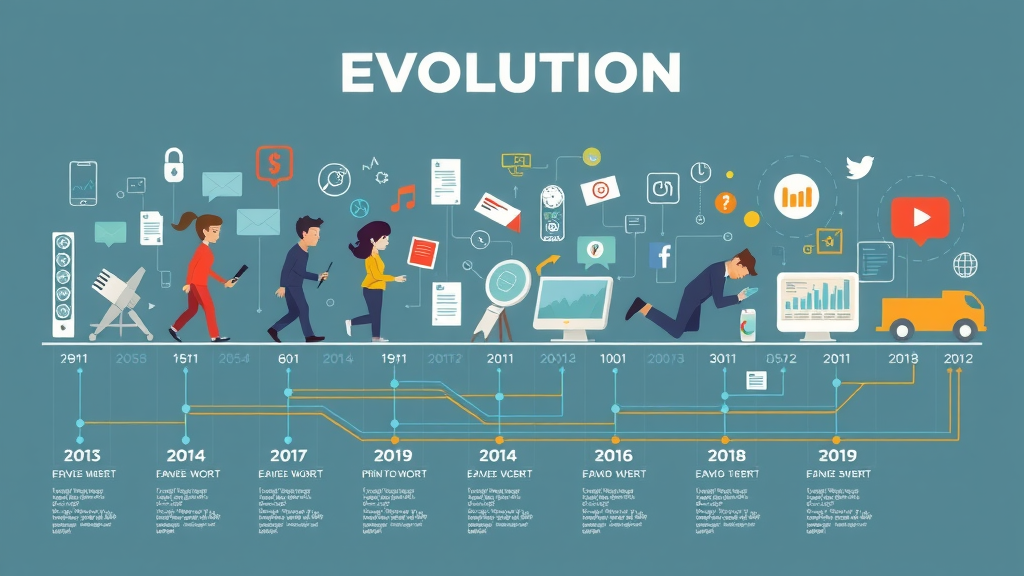Did you know that over 70% of businesses leveraging the newest content marketing trends have experienced record-breaking ROI in the past year? This isn’t just hype—today’s trends are revolutionizing how brands capture audiences, build loyalty, and outsmart competitors online. With digital and social media landscapes shifting faster than ever, staying ahead with current marketing strategies could be the breakthrough you’ve been searching for. In this in-depth guide, discover the real impact these trends are making and learn actionable ways to upgrade your own content strategy for lasting growth.
Startling Realities: Why Content Marketing Trends Matter in 2024
In 2024, the value of content marketing trends extends far beyond buzzwords and industry talk. Businesses that recognize and adapt to evolving marketing trends report sharper audience engagement, higher conversion rates, and substantial boosts in return on investment. Modern digital marketing isn't just about creating content; it’s about aligning with how people search, interact, and consume. For content marketers, understanding shifts like personalized storytelling, AI-generated content, video content, and voice search is fundamental. These advancements are rapidly changing the way brands reach and influence their target audiences—often determining who achieves market leader status.
Ignoring these content marketing trends is now a business risk. Today’s consumers expect hyper-relevant, visually engaging, and interactive content across all major media platforms. If your content creation efforts feel stagnant or if you’re not leveraging new technologies for your marketing team, the competition will quickly outpace you. Embracing these developments means more opportunities to boost brand awareness, create deeper customer relationships, and ultimately grow revenue. In essence, the companies that thrive in today’s digital marketing storm are those that not only adapt—but lead—with the right content marketing trend strategies at the core of their approach.
To further enhance your understanding of how to build a robust content marketing plan that incorporates these emerging trends, you might find it valuable to explore comprehensive strategies for developing a winning content marketing approach. This resource offers actionable steps and proven frameworks that complement the latest industry shifts discussed here.

"According to a recent study, businesses that adapt to new content marketing trends see up to 30% higher engagement rates within six months."
What You'll Learn About Content Marketing Trends
- Why content marketing trends are reshaping digital marketing strategies.
- How to leverage top marketing trends for maximum ROI.
- Key strategies for content marketers in 2024.
- How new technologies are influencing digital marketing.
- Actionable steps to implement leading marketing trends in your campaigns.

Understanding Content Marketing Trends: Definitions and Frameworks
What Are Content Marketing Trends and Why Are They Important?
Content marketing trends refer to the prevailing shifts, tactics, and technological advancements influencing how companies approach content creation and distribution. In the fast-paced world of digital marketing, embracing these trends is essential for brands to stay top-of-mind and relevant to their audiences. Trends can be as broad as the pivot toward video content, or as nuanced as leveraging AI tools for better segmentation and personalization. The importance lies in their power to inform smarter marketing strategy decisions—helping brands overcome market saturation, meet changing consumer behaviors, and drive measurable growth.
Moreover, the explosion of channels such as social media platforms and podcasts has made it easier than ever to connect with your target audience. Yet, it’s not just about presence—it’s about aligning your marketing efforts with how people interact and search. For businesses, failing to incorporate new marketing trends into their content marketing means ceding ground to more agile competitors. It’s this relentless pace of change that makes studying and implementing the latest trends so vital for content marketers everywhere.
Types of Content Marketing Trends: From Social Media to Voice Search
There are many types of content marketing trends shaping the landscape today. Social media continues to be a dominant force, with platforms like TikTok and Instagram propelling trends in short-form video content and influencer collaborations. Meanwhile, voice search is transforming the way users discover information, making conversational and FAQ-driven content crucial for a strong search engine presence. Podcasts are another area where brands create content that’s convenient and intimate, fostering loyal communities over time.
Other fast-rising trends include interactive content (quizzes, polls, live streams), AI-generated content (streamlining production and personalization), and cross-platform storytelling that ensures brand consistency. Each trend presents unique opportunities—and challenges. For instance, while AI tools can rapidly generate new material, maintaining quality and authenticity is a concern. By understanding the full spectrum of trends, content marketers can develop a more agile, impactful content strategy suited for 2024 and beyond.
| Platform | Top Trend | Benefits | Challenges |
|---|---|---|---|
| Blogs | Long-form, SEO-rich articles | Improved search result rankings, establishes authority | Requires consistent, quality content creation |
| Social Media | Short-form video, influencer collaborations | High engagement, viral potential, brand awareness | Algorithm changes, keeping content fresh |
| Video Content (YouTube, TikTok) | Shorts, live streaming, storytelling | Visual appeal, strong audience retention | Production costs, requires creativity |
| Podcasts | Expert interviews, serial formats | Builds trust, deepens connection with audience | Time-consuming to produce, harder to measure engagement |
The Evolution of Digital Marketing and Content Marketing Trends

How Digital Marketing Is Shaped by New Marketing Trends
Digital marketing has rapidly evolved, drawing momentum from each wave of disruptive technologies and consumer behaviors. Marketing trends like voice search, influencer marketing, and hyper-personalized campaigns have reshaped how marketers connect with their target audience. The explosion of AI tools makes creating, personalizing, and delivering content smoother and more effective. Marketers now have at their disposal an arsenal of tactics that weren’t even imaginable a few years ago—ranging from programmatic ad buying to interactive AR experiences. These advancements demand that marketing teams stay perpetually informed and agile, ensuring brand messaging meets the expectations of digital consumers.
As consumer habits shift, so too must content strategies. Audiences increasingly expect frictionless, immediate, and authentic experiences—whether engaging with a brand on social media or seeking information via a smart device’s voice assistant. As a result, marketers who recognize the symbiosis between advancing technology and evolving consumer needs are primed to outperform their competition. The modern digital landscape rewards those willing to experiment with new content marketing trends and integrate these learnings into every marketing effort.
Why Marketing Strategies Must Evolve With Content Marketing Trends
The digital landscape is always in motion, meaning yesterday’s tactics can quickly become obsolete. That’s why evolving your marketing strategies is essential for success in content marketing. With each new trend, whether it’s embracing a new media platform, leveraging interactive content, or optimizing for the latest search engine algorithms, brands gain opportunities to improve their customer engagement and stand out. Remaining static means risking irrelevance—a fate no business wants to face in the current climate.
To keep up, marketers need to consistently audit their content strategy, monitor performance metrics, and test new approaches. The most effective marketers in 2024 blend data-driven insights with creativity—finding the right mix of innovation without losing sight of core brand messaging. In short, adapting to content marketing trends isn’t optional; it’s the only way to protect your digital footprint and drive continued ROI.
Key Content Marketing Trends Transforming 2024

Interactive Content: Engaging Modern Audiences
Interactive content has become a game-changer for brands seeking to boost audience engagement. From polls and quizzes to immersive experiences like AR filters, interactive formats provide a two-way dialogue between companies and consumers. This marketing trend enables brands to gather real-time feedback, understand audience preferences, and craft more tailored messaging. Interactive content also raises brand awareness and keeps users engaged longer, both of which are crucial metrics for content marketers evaluating success.
As audiences crave more meaningful engagement rather than just passive consumption, interactive content delivers. Marketers using these formats have seen notable lifts in conversion rates and overall campaign effectiveness. To maximize results, it’s essential to align interactive experiences with brand goals and ensure a seamless user journey across all channels—including integration with social media platforms and your main website. This trend is poised to keep growing, as technology and creative strategy converge to make even more innovative interactive experiences possible.
Video Content and Short-Form Media: The New Standard for Content Marketers
There’s no denying that video content—especially short-form—is now king in content marketing. Whether it’s TikTok, Instagram Reels, or YouTube Shorts, these formats dominate because they are easy to consume, share, and create emotional resonance. Brands that embrace short, punchy videos enjoy viral potential and wider reach, making this one of the most impactful content marketing trends in 2024. Video also opens the door for authentic storytelling and brings personalities to life, further humanizing brands for viewers.
For content marketers, investing in video is now a key pillar of any successful content strategy. While high-quality production values matter, authenticity and relatability are even more important for connecting with viewers. Additionally, platforms are rewarding video content with better organic reach and engagement, making it imperative for marketers to skill up in this area. Don’t overlook longer-form educational videos, either—they’re instrumental for building trust and positioning brands as thought leaders within their industries.

AI Tools and Generated Content: Opportunities and Pitfalls
The rise of AI tools and generated content is one of the most significant modern marketing trends. AI can automate aspects of content creation, from drafting blog posts and product descriptions to curating personalized recommendations. For marketers, this means unprecedented speed and scale. Content marketers can use AI tools to test headlines, identify best-performing topics, and even predict what types of content will engage the target audience most effectively.
However, it’s not all upside. There are real pitfalls to AI-generated content—quality, originality, and authenticity must remain top priorities. Over-reliance on automated content can lead to repetitive or generic messaging, hurting your brand’s connection with its audience. The best results come from combining AI’s efficiency with human creativity and oversight. Assess each use case individually to determine where automation adds value without sacrificing the unique voice that sets your business apart.

Voice Search and the Rise of Conversational Content
Voice search is redefining how people find information online—and how brands need to create content for search engines. With smart speakers and virtual assistants now commonplace, optimizing content for conversational queries is essential. This trend prioritizes natural language, direct answers, and featured snippets that align with how users speak rather than type.
To win in this environment, marketers should focus on FAQ pages, long-tail keywords, and clear, concise answers. Ensuring your content is mobile-friendly and loads quickly will also boost your rankings in voice search results. As voice technology advances, expect search engines to favor brands that prioritize conversational, helpful content tailored to spoken questions over traditional, keyword-stuffed formats.
Strategic Approaches: Adapting Your Content Strategy to New Content Marketing Trends
How Content Marketers Can Future-Proof Their Content Creation
Future-proofing your content creation involves staying ahead of emerging marketing trends and investing in skills, tools, and analytics that allow quick adaptation. This means building flexibility into every layer of your content strategy—from content topic ideation to distribution methods. For example, regularly monitoring analytics helps you spot shifts in user behavior early and act accordingly. Involving both human creativity and AI ensures content remains relevant, engaging, and true to your brand’s values.
Continuous education is also critical for content marketers. Attend webinars, join industry groups, and follow thought leaders to stay alert to changes. A future-proof strategy is never static: audit your processes quarterly, test new formats, and be prepared to sunset underperforming initiatives in favor of higher-impact experiments. By blending agility with insight, your marketing team can consistently produce content that resonates—regardless of changing platforms or algorithms.
Best Practices for Building an Agile Marketing Strategy
Building an agile marketing strategy requires an openness to new ideas and swift action when trends emerge. Short feedback loops, ongoing data analysis, and cross-team collaboration help you pivot quickly when opportunity strikes—or when a platform shifts its algorithm. Setting clear goals and regularly reviewing KPIs ensures your campaigns remain nimble yet targeted. Using AI tools can speed up A/B testing and help content marketers make smarter decisions about where to focus efforts.
Transparency and communication across all departments, from the marketing team to sales and product, foster a culture of continuous improvement. By embracing agility and leaving room for experimentation, brands stay ahead of evolving trends and consumer preferences—essential to maximize ROI in an ever-shifting landscape.
Measuring Return on Investment in Evolving Content Marketing Trends
As content marketing trends become more complex, measuring return on investment is increasingly data-driven. This means using analytics platforms and dashboards to track engagement rates, conversions, lead quality, customer retention, and revenue impact. Tracking which trends or channels (e.g., video content or social media platforms) contribute most to marketing goals allows for smarter budget allocation and refined strategy. For new trends like AI-generated content or interactive formats, establishing clear metrics up front is critical for tracking performance versus expectations.
Most importantly, regular reporting cycles enable content marketers to note what’s working and quickly adjust. Granular measurement leads to actionable insights, helping you justify your marketing spend and stay ahead of competitors clinging to outdated techniques.
"Agility in your content strategy is no longer a luxury—it’s an essential part of thriving in digital marketing."
Content Creation in 2024: Quality Content, Authenticity, and Media Platforms

Quality Content vs. Quantity: What Content Marketers Must Know
As digital spaces become more crowded, the need for quality content has never been more urgent. Brands must resist the urge to churn out endless pieces and instead focus on depth, insight, and value for the target audience. High-quality pieces outperform higher volumes of average content in search rankings, audience retention, and brand authority. This distinction is central for content marketers aiming to boost ROI and long-term loyalty.
Consistently delivering value—whether through in-depth guides or compelling video narratives—earns you trust and repeat visits. Use data to understand audience preferences and identify top-performing pieces, then double down on formats that best resonate. In 2024, content marketers who prioritize quality will rise above the noise while others are lost in the daily churn of the algorithm.
Choosing the Right Media Platforms for Your Marketing Trends
Not all media platforms are created equal, and your content marketing trend adoption should reflect that. Today's audiences are fragmented across blogs, social channels, video platforms, and podcasts—each with distinct modes of storytelling and interaction. Tailoring formats to each platform is key. For example, short, visual content soars on Instagram and TikTok, while longer educational videos fit YouTube’s ecosystem.
Choose your core channels based on where your audience spends the most time and the type of stories you want to tell. Cross-posting must be strategic; native content generally outperforms repurposed or bulk-scheduled posts. Keep an eye on emerging platforms too, as early adopters often enjoy outsized rewards—just be sure the effort aligns with available resources and core business goals.
The Power of Storytelling in Content Marketing
Storytelling is the heart of content marketing trends in 2024, offering a direct route to human connection. In saturated markets, memorable stories create emotion, spark engagement, and drive action. Content marketers can use storytelling to differentiate their brand, illustrate complex ideas, and foster customer loyalty. Stories can be the glue across diverse channels, uniting everything from video content and podcasts to blog posts and email campaigns.
Great stories start with clarity about the brand mission and audience needs. Use authentic voices, highlight customer experiences, or create behind-the-scenes pieces that show your brand’s human side. In a world where AI and algorithms rule, storytelling is what keeps your content—and your marketing team—uniquely relevant and memorable.
Social Media Trends Every Content Marketer Should Know

Trending Social Media Platforms for Content Marketing
The social landscape continues to shift, with platforms like TikTok, Instagram, and LinkedIn commanding massive and unique audiences. TikTok and Instagram Reels are particularly powerful for short-form, viral video content; meanwhile, LinkedIn is the go-to for B2B thought leadership. Even emerging platforms like BeReal present new opportunities for raw, unfiltered brand interactions.
Knowing which social media platforms align with your audience and business goals is crucial for effective content marketing. Brands should dedicate resources to understanding user behaviors and content preferences for each platform. Don’t forget to test and experiment—rapid changes in platform features and user demographics mean agility is key to riding these marketing trends successfully.
Leveraging Social Media Influencers and Communities
Influencer marketing and community-building have cemented themselves as vital components of content marketing trends. Collaborations with micro- and nano-influencers are often more authentic, driving higher engagement rates and more meaningful brand relationships. Communities, whether niche Facebook groups or Discord servers, offer brands a platform to foster loyalty, gather insights, and co-create compelling interactive content.
For maximum impact, partnerships must be symbiotic—choose influencers whose values align with your brand, and co-develop content that provides value to both audiences. Building and nurturing brand communities also gives marketers direct access to ongoing conversations, laying the groundwork for future trendspotting and innovation.
Content Marketers Share Insights: Real-World Case Studies
"Implementing the latest content marketing trends grew our audience engagement by 150% in just three months."
Case studies consistently show that businesses who proactively adopt content marketing trends outperform peers still stuck in old routines. For instance, a financial services firm that launched an interactive retirement calculator on its site saw session times triple, while a SaaS company using AI tool-assisted segmentation boosted open rates and conversions through personalized newsletters. In another example, a retail brand leveraging TikTok’s algorithm for short product demos reached millions of new viewers in weeks.
The common thread? These companies listened to their audience, piloted new approaches, and tracked results closely. Such adaptability enabled them to spot what worked fast, scale successes, and maintain relevance amid industry shifts. For your own team, benchmarking against these real-world successes is a valuable way to gather inspiration and anticipate the impact of future marketing trends.
Harnessing AI Tools and Generated Content for Maximum Impact
How to Use AI Tools and Generated Content in Your Marketing Trend
Smart use of AI tools and generated content can supercharge your marketing strategy. Start by identifying tasks that can be automated, like SEO keyword research, content curation, or initial drafts. AI tools work exceptionally well in generating product descriptions or social media captions at scale—freeing up time for marketers to focus on creative ideation and personalization. When paired with analytics, AI can also predict what kind of content creation will resonate most with your audience.
However, the best approach is always hybrid: leverage AI for efficiency, but include human editing to ensure tone, context, and brand fit. Always test and review generated content for accuracy, bias, or repetition—your brand reputation depends on it. Gradually expanding the use of AI tools will keep your content strategy both innovative and reliable.

Ethical Considerations for Content Creation with AI
While AI-generated content accelerates content marketing, it also raises important questions about ethics and transparency. Brands must disclose when content is AI-generated, avoid reinforcing biases present in training data, and continually review outputs for factual integrity. Additionally, overusing AI at the expense of human authenticity risks breaking trust with audiences, so always maintain a mix of human and machine contributions.
Being upfront about automation, prioritizing transparency, and committing to regular audits of AI-generated assets are now best practices for responsible marketers. Ultimately, the professional’s role is to ensure technology enhances—not diminishes—content quality and customer relationships.
Interactive Content and the Rise of Conversational Marketing
Best Interactive Content Formats for Content Marketing
Interactive content goes beyond simple visuals to create immersive experiences—a standout tactic among content marketing trends. Formats like quizzes, calculators, polls, and live streams encourage genuine participation, making users a part of your brand story. These resources not only improve dwell time and engagement rates but also provide invaluable first-party data for future targeting.
Successful brands tailor interactive experiences to customer pain points and interests. For example, an online retailer might create a style quiz to personalize suggestions, while a SaaS company could launch an ROI calculator to guide buying decisions. This blend of utility and entertainment entrenches your brand in consumers’ minds.

Optimizing Content for Voice Search and Next-gen Search Engines
With the spike in voice-activated searches, optimizing for voice search has become non-negotiable for forward-thinking brands. This means writing naturally, using conversational keywords, and offering succinct, clear responses to likely user queries. Schema markup and FAQ sections help search engines better understand your content, enhancing your chances of featuring in voice-based and zero-click results.
Next-gen search engines increasingly prioritize user intent over exact-match keywords, making context, structure, and relevance crucial. Brands that adapt their content for voice and AI-powered search enjoy broader visibility—and are poised to stay ahead in this era of frictionless, multi-device discovery.
Personalization in Content Marketing Trends: Beyond the Basics
Using Data to Drive Marketing Strategies and Content Personalization
Data is the cornerstone of real personalization in content marketing trends. Advanced analytics reveal user behaviors, preferences, and pain points—allowing marketers to tailor messaging, offers, and timing for maximum resonance. Leveraging data from all touchpoints, from social media platforms to your main website, ensures that you’re sending the right message to the right person at the right time.
Today’s AI tools make it easier to segment audiences and automate delivery of personalized experiences. Still, content marketers must balance automation with creativity, ensuring that each touchpoint feels individually crafted. Used correctly, data-driven insights elevate customer satisfaction and significantly improve conversion rates.

Creating Content That Converts: Real-world Tactics
Conversion-focused content blends strategy, creativity, and analytics to turn prospects into loyal advocates. Start by mapping the customer journey and crafting content for each stage—from discovery and education to consideration and decision. Use social proof, testimonials, and clear calls to action to encourage next steps. On media platforms like YouTube or Instagram, include shoppable links and interactive elements to reduce friction.
Constant testing is crucial: analyze engagement metrics, A/B test headlines and visuals, and refine messaging based on user feedback. Ultimately, the combination of authentic storytelling, tailored offers, and seamless user experience will maximize the impact and ROI of your content marketing trends adoption.
Lists: Top 10 Content Marketing Trends to Watch in 2024
- Growing Importance of Short-Form Video Content
- Adoption of AI Tools and Generated Content
- Rise of Interactive Content
- Enhanced Personalization in Digital Marketing
- Voice Search Optimization
- Sustainability and Ethical Marketing Trend
- Micro-Influencer Campaigns
- User-Generated Content Integration
- Cross-Platform Content Distribution
- Measuring Return on Investment in Content Marketing
FAQs on Content Marketing Trends
What types of content marketing trends should brands focus on today?
Brands should focus on emerging trends such as short-form video content, leveraging AI tools for personalized messaging, building interactive experiences, and prioritizing voice search optimization. Investing in influencer partnerships and user-generated content integration also positions brands well for evolving audience preferences and higher ROI.
How often should content marketers update their strategies for new marketing trends?
Content marketers should review and update their strategies at least quarterly, or whenever there’s a major shift in platform algorithms, user behavior, or new technology adoption. Staying proactive keeps your content marketing trend approach fresh, competitive, and in alignment with your audience’s evolving habits.
What is the role of AI in current content marketing trends?
AI plays a critical role by automating routine content creation, segmenting audiences, and optimizing distribution. AI tools help marketers analyze data in real time, predict trends, and produce tailored content more efficiently—supporting smarter decisions and greater agility in today’s fast-moving marketing environment.
How can I measure the success of my content marketing trends adoption?
Key metrics include engagement rates, conversions, audience growth, and brand awareness. Using analytics platforms, track performance across all channels to see which trends yield the strongest results. Setting clear KPIs and regular measurement cycles allows for data-driven improvements and maximizes your marketing ROI.
People Also Ask About Content Marketing Trends
What are the most effective content marketing trends for 2024?
Answer: The most effective content marketing trends for 2024 include short-form video content, interactive experiences, AI-driven content creation, and personalization strategies tailored to consumer behavior.
How do content marketing trends impact digital marketing ROI?
Answer: Adopting up-to-date content marketing trends allows digital marketers to engage target audiences more effectively, increase conversion rates, and generate measurable improvements in return on investment by leveraging data, creativity, and platforms strategically.
Why should marketers follow emerging marketing trends?
Answer: Following emerging marketing trends helps marketers stay competitive, adjust to changes in consumer behavior, capitalize on new opportunities, and prevent stagnation in their strategies.
Key Takeaways: The Case for Content Marketing Trends in 2024
- Content marketing trends drive engagement and business growth.
- Adapting strategies is essential in the fast-paced world of digital marketing.
- Technology like AI and voice search are shaping new marketing trend practices.
- Future-proof your content strategy by staying informed and agile.
Conclusion: Are Content Marketing Trends the Breakthrough You Need?
Embracing content marketing trends in 2024 is the key to unlocking powerful engagement, growth, and sustained competitive advantage. Adapt, experiment, and measure—your market leadership depends on it.
Next Steps: Building Your Content Marketing Plan for the Future
Assess your audience, audit existing content, and map out a flexible roadmap that incorporates new trends and tools. Regularly adapt, experiment, and leverage quality over quantity—the best results are achieved when you blend innovation with authenticity.
"Ultimately, success in digital marketing depends on your willingness to embrace content marketing trends and adapt quickly."
If you’re ready to take your digital marketing to the next level, consider exploring the broader landscape of breakthrough strategies that can amplify your results in 2024. Our in-depth analysis on how content marketing trends can be your breakthrough this year offers a strategic perspective on integrating innovation, technology, and audience insights. By diving deeper into these advanced approaches, you’ll uncover new ways to future-proof your marketing efforts and stay ahead of the competition. Let your curiosity lead you to the next big opportunity in content marketing and discover what’s possible when you embrace change with confidence.
 Add Row
Add Row  Add
Add 




Write A Comment